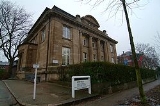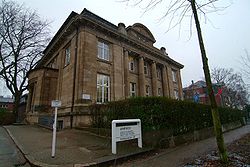
UNESCO Institute for Lifelong Learning
Encyclopedia
The UNESCO Institute for Lifelong Learning (formerly: UNESCO Institute for Education) is one of six educational institutes of UNESCO
. It is a non-profit international research, training, information, documentation and publishing centre on literacy
, non-formal education, adult and lifelong learning
. By linking educational research, policy and practice in these areas UIL makes a special contribution in enhancing access to learning, and improving the environment and quality of learning for all in all regions of the world. UIL provides services in literacy, non-formal education, adult and lifelong learning to UNESCO's Member States, NGOs and grassroots and community organizations, but also to partners in civil society and the private sector. In doing so, the Institute works in close collaboration with its Paris headquarters, with UNESCO field offices in different countries, with sister institutes and with national and international partners.
UIL provides services in literacy, non-formal education, adult and lifelong learning to UNESCO's Member States, NGOs and grassroots and community organizations, but also to partners in civil society and the private sector. In doing so, the Institute works in close collaboration with its Paris headquarters, with UNESCO field offices in different countries, with sister institutes and with national and international partners.
UIL is based in Hamburg
, Germany. The Senate (government) of the Free and Hanseatic City of Hamburg provides the Institute with premises close to the University, in a house protected as a historic monument. In February 2007 a country agreement was signed which defines the terms and conditions under which the UIL is hosted by the Federal Republic of Germany
.
and poverty eradication, nurturing diversity, defeating HIV/AIDS, protecting the environment) with policy-driven research, capacity-building, networking, publications and technical services for Member States and non-governmental and civil society organisations, as well as private providers at their request.
Research work is mainly policy-driven and action-oriented. The research carried out by the Institute may take the form of individual case and country studies, comparative analyses, regional and cross-regional syntheses, international surveys, conceptual and position papers, co-operative and joint investigations with academics, partner institutions, governmental organizations, NGOs and CSOs, etc.
Specific research questions and themes relate to the following:
UNESCO
The United Nations Educational, Scientific and Cultural Organization is a specialized agency of the United Nations...
. It is a non-profit international research, training, information, documentation and publishing centre on literacy
Literacy
Literacy has traditionally been described as the ability to read for knowledge, write coherently and think critically about printed material.Literacy represents the lifelong, intellectual process of gaining meaning from print...
, non-formal education, adult and lifelong learning
Lifelong learning
Lifelong learning is the continuous building of skills and knowledge throughout the life of an individual. It occurs through experiences encountered in the course of a lifetime...
. By linking educational research, policy and practice in these areas UIL makes a special contribution in enhancing access to learning, and improving the environment and quality of learning for all in all regions of the world.

UIL is based in Hamburg
Hamburg
-History:The first historic name for the city was, according to Claudius Ptolemy's reports, Treva.But the city takes its modern name, Hamburg, from the first permanent building on the site, a castle whose construction was ordered by the Emperor Charlemagne in AD 808...
, Germany. The Senate (government) of the Free and Hanseatic City of Hamburg provides the Institute with premises close to the University, in a house protected as a historic monument. In February 2007 a country agreement was signed which defines the terms and conditions under which the UIL is hosted by the Federal Republic of Germany
Germany
Germany , officially the Federal Republic of Germany , is a federal parliamentary republic in Europe. The country consists of 16 states while the capital and largest city is Berlin. Germany covers an area of 357,021 km2 and has a largely temperate seasonal climate...
.
Mission
UIL's mission is to see to it that all forms of education and learning – formal, non-formal and informal – are recognized, valued and available for meeting the demands of individuals and communities throughout the world. UIL responds to these demands and helps meet the challenges facing humanity (peace and democracy, sustainable developmentSustainable development
Sustainable development is a pattern of resource use, that aims to meet human needs while preserving the environment so that these needs can be met not only in the present, but also for generations to come...
and poverty eradication, nurturing diversity, defeating HIV/AIDS, protecting the environment) with policy-driven research, capacity-building, networking, publications and technical services for Member States and non-governmental and civil society organisations, as well as private providers at their request.
Projects
- LIFE (Literacy Initiative for Empowerment)
- Coordination of the 6th International Conference on Adult Education (CONFINTEA VI)
- ALADIN network
- Coordination of the Adult Learners Week
- Cooperation with the Association for the Development of Education in Africa (ADEA)
Research
UIL’s research covers appropriate concepts, good practice, favourable conditions and innovative approaches in the areas of literacy, non-formal education, adult and lifelong learning in different cultural contexts, including all modes of learning (formal, non-formal and informal), with a view to the creation of lifelong learning environments, the making of literate societies and the building of learning societies. All research activities aim at promoting adult and lifelong learning and at highlighting the contribution of learning to poverty alleviation, sustainable human development, democracy and critical citizenship.Research work is mainly policy-driven and action-oriented. The research carried out by the Institute may take the form of individual case and country studies, comparative analyses, regional and cross-regional syntheses, international surveys, conceptual and position papers, co-operative and joint investigations with academics, partner institutions, governmental organizations, NGOs and CSOs, etc.
Specific research questions and themes relate to the following:
- Theories and practices of literacy
- Foundations of lifelong learning
- The making of literate societies
- The creation of supportive policy and legislative environments/conditions for lifelong learning;
- The creation of literate environments, especially in multicultural and multilingual settings;
- Integration of formal, non-formal and informal education: recognition, accreditation and validation of non-formal, informal and experiential learning; qualification frameworks, equivalencies and bridges;
- Adult learning for sustainable development with a focus on HIV/AIDS, environmental protection, democratic participation, conflict prevention, critical citizenship and good governance;
- Gender mainstreaming in literacy, non-formal education, adult and lifelong learning with a focus on budgeting, monitoring and evaluation;
- Development of gender-just and culturally sensitive indicators;
- Impact of literacy, non-formal education and adult learning;
External links
- UIL's Website
- UIL's LIFE Portal
- UIL's GRALE Website Website about the Global Report on Adult Learning and Education (GRALE) prepared by UIL
Sources
- Elfert, Maren (Ed.): Towards an Open Learning World : 50 Years UNESCO Institute for Education. Hamburg : UNESCO Institute for Education, 2002

